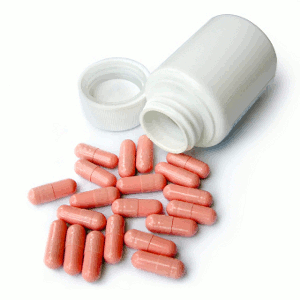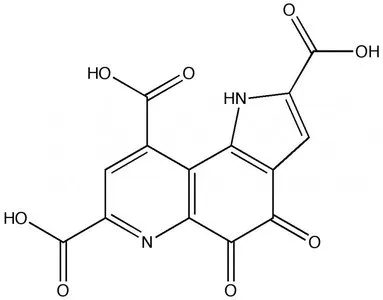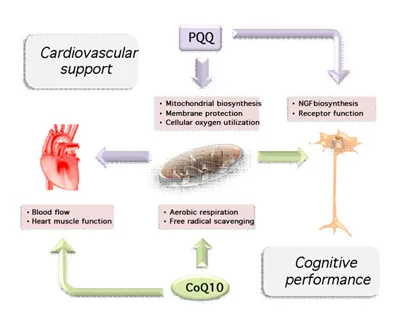What is PQQ and what does it do?...


PQQ (Pyrroloquinoline quinone - C14H6N2O8) is a redox cofactor (a chemical compound or metallic ion that is required for an enzyme's activity). It enables enzymes involved in cellular functions ranging from "cellular growth, development, differentiation, and survival."
It was discovered in 1979 when researchers initially noted PQQ for increasing the growth of bacteria. Later testing with animals proved that it plays a central role in all mammals with deprivation of PQQ leading to abnormal reproduction and growth. Animal studies show that "[w]hen PQQ is omitted from chemically defined diets in mammals it leads to growth impairment, compromised immune status, and abnormal reproductive function." The past decade PQQ has shown consistent results as those found in animals studies.
Today, PQQ is not considered a "vitamin" but that may soon change with greater awareness and further research. It is found in the soil, kiwifruit and human bodily fluids such as breast milk.
PQQ's importance to YOU...

By allowing key enzymes involved in energy production within your mitochrondria to function and its overall antioxidant effect on mitochondria, benefits of this vitamin-like compound include:
Enhancement of brain function... PQQ is a powerful antioxidant, for example when compared with vitamin C which can carry out 4 catalytic conversion cycles, PQQ is able to do up to 20,000 cycles. This highlights its ability to carry out oxidative and reduction reactions, reducing oxidative stress. Many other neurological benefits have been documented as well such as added protection against neurotoxicity and an exceptional protection against Parkinson's disease by preventing the self-oxidation of the DJ-1 gene. In 2016, a double-blind, placebo controlled study in Japan of 41 elderly individuals showed PQQ improved blood flow to the prefrontal cerebral cortex after only 12 weeks. https://www.ncbi.nlm.nih.gov/pubmed/26782228
Increased mitochrondrial function... PQQ stimulates mitochondrial biogenesis which is the production of new mitochondrial cells. When combined with CoQ10 , which is also very central to mitochondrial energy production, the effects of PQQ are even more dramatic. An animal study in 2011 done by 'PLoS One' determined "PQQ deficiency impacts a number of parameters related to normal mitochondrial function." https://www.ncbi.nlm.nih.gov/pubmed/21814553
Sources of PQQ...

- parsley
- celery
- spinach
- papaya
- kiwi
- carrot
- sweet potato
- banana
- egg yolk
If you're interested in receiving the full benefits of a supplement, the recommended dosage for improved brain function and mitochondrial health is a dose of 20mg a day which is consistent with animal and human studies.
To avoid support for the monolithic, deep state partner Amazon, check out this link for more information on a great PQQ product by Dr. Mercola. https://products.mercola.com/berberine-pqq-supplement/
PQQ, nutrition's rising star...
With all this in mind it's easy to see why all the fuss over PQQ. This compound can help and benefit heart health, energy production, weight loss, brain function, immune function and sleep. Though, not recognized as essential in the mainstream, it is clear how central the compound is in many respects to our health. Please, spread the word with your family and friends about this great compound and combine it with CoQ10 for further benefits!
Here's an in depth look at PQQ and other natural supplements in this interview by Dr. Mercola with Dr. Michael Murray:
https://draxe.com/pqq-supplement/
http://doctormurray.com/pqq-the-next-nutrient-superstar/
https://en.wikipedia.org/wiki/Pyrroloquinoline_quinon
https://www.pureencapsulations.com/newscap-03-01-10

🐦 TWITTER @newtreehints
🎬 DTUBE @newtreehints
📷 NSTGRM @newtreehints